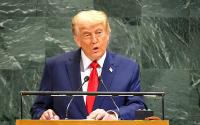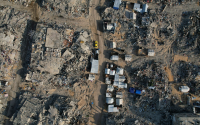Please join Barbara Ehrenreich, Edward Said, Lydia Sargent, Michael Albert, Stephen Shalom, Howard Zinn, Daniel Ellsberg, Katha Pollitt, Cornel West, Adolph Reed, Rabbi Michael Lerner, Naomi Weisstein, James Weinstein, Stanley Aronowitz, John Leonard, Sue Leonard, Matthew Rothschild, Ros Petchesky, and Robin D.G. Kelley in signing this anti-war statement from the Campaign for Peace and Democracy (See below for the list of initial signers and how to add your name.)
Thank you,Joanne Landy, Thomas Harrison, Jennifer Scarlott, Co-Directors, CPD
WE OPPOSE Both Saddam Hussein and the U.S. War on Iraq:A call for a new, democratic U.S. foreign policy
We oppose the impending U.S.-led war on Iraq, which threatens to inflict vast suffering and destruction, while exacerbating rather than resolving threats to regional and global peace. Saddam Hussein is a tyrant who should be removed from power, both for the good of the Iraqi people and for the security of neighboring countries. However, it is up to the Iraqi people themselves to oust Saddam Hussein, dismantle his police state regime, and democratize their country. People in the United States can be of immense help in this effortnot by supporting military intervention, but by building a strong peace movement and working to ensure that our government pursues a consistently democratic and just foreign policy.We do not believe that the goal of the approaching war against Iraq is to bring democracy to the Iraqis, nor that it will produce this result. Instead, the Bush Administration’s aim is to expand and solidify U.S. predominance in the Middle East, at the cost of tens of thousands of civilian lives if necessary. This war is about U.S. political, military and economic power, about seizing control of oilfields and about strengthening the United States as the enforcer of an inhumane global status quo. That is why we are opposed to war against Iraq, whether waged unilaterally by Washington or by the UN Security Council, unaccountable to the UN General Assembly and bullied and bribed into endorsing the war.The U.S. military may have the ability to destroy Saddam Hussein, but the United States cannot promote democracy in the Muslim world and peace in the Middle East, nor can it deal with the threat posed to all of us by terrorist networks such as Al Qaeda, and by weapons of mass destruction, by pursuing its current policies. Indeed, the U.S. could address these problems only by doing the opposite of what it is doing today that is, by:
Renouncing the use of military intervention to extend and consolidate U.S. imperial power, and withdrawing U.S. troops from the Middle East. Ending its support for corrupt and authoritarian regimes, e.g. Saudi Arabia, the Gulf states and Egypt. Opposing, and ending U.S. complicity in, all forms of terrorism worldwide not just by Al Qaeda, Palestinian suicide bombers and Chechen hostage takers, but also by Colombian paramilitaries, the Israeli military in the Occupied Territories and Russian counterinsurgency forces in Chechnya. Ending the cruel sanctions on Iraq, which inflict massive harm on the civilian population. Supporting the right of national self-determination for all peoples in the Middle East, including the Kurds, Palestinians and Israeli Jews. Ending one-sided support for Israel in the Palestinian-Israeli conflict. Taking unilateral steps toward renouncing weapons of mass destruction, including nuclear weapons, and vigorously promoting international disarmament treaties. Abandoning IMF/World Bank economic policies that bring mass misery to people in large parts of the world. Initiating a major foreign aid program directed at popular rather than corporate needs.A U.S. government that carried out these policies would be in a position to honestly and consistently foster democracy in the Middle East and elsewhere. It could encourage democratic forces (not unrepresentative cliques, but genuinely popular parties and movements) in Iraq, Iran and Syria, as well as Egypt, Pakistan, Saudi Arabia, the Gulf States and Turkey. Some of these forces exist today, others have yet to arise, but all would flower if nurtured by a new U.S. foreign policy.These initiatives, taken together, would constitute a truly democratic foreign policy. Only such a policy could begin to reverse the mistrust and outright hatred felt by so much of the world’s population toward the U.S. At the same time, it would weaken the power of dictatorships and the appeal of terrorism and reactionary religious fundamentalism. Though nothing the United States can do would decisively undermine these elements right away, over time a new U.S. foreign policy would drastically undercut their power and influence.The Administration’s frantic and flagrantly dishonest efforts to portray Saddam Hussein as an imminent military threat to people in this country and to the inhabitants of other Middle Eastern countries lack credibility. Saddam Hussein is a killer and serial aggressor who would doubtless like nothing better than to wreak vengeance on the U.S. and to dominate the Gulf Region. But there is no reason to believe he is suicidal or insane. Considerable evidence suggests that Saddam Hussein is much weaker militarily than he was before the Gulf War and that he is still some distance from being able to manufacture nuclear weapons. But most important, unlike Al Qaeda, he has a state and a position of power to protect; he knows that any Iraqi act of aggression now against the U.S. or his neighbors would bring about his total destruction. As even CIA Director George Tenet has pointed out, it is precisely the certainty of a war to the finish against his regime that would provide Saddam Hussein with the incentive he now lacks to use whatever weapons he has against the U.S. and its allies. Weapons of mass destruction endanger us all and must be eliminated. But a war against Iraq is not the answer. War threatens massive harm to Iraqi civilians, will add to the ranks of terrorists throughout the Muslim world, and will encourage international bullies to pursue further acts of aggression. Everyone is legitimately concerned about terrorism; however, the path to genuine security involves promoting democracy, social justice and respect for the right of self-determination, along with disarmament, weapons-free-zones, and inspections. Of all the countries in the world, the United States possesses by far the most powerful arsenal of weapons of mass destruction. If the U.S. were to initiate a democratic foreign policy and take serious steps toward disarmament, it would be able to encourage global disarmament as well as regional demilitarization in the Middle East.The Bush Administration has used the alleged Iraqi military danger to justify an alarming new doctrine of preemptive war. In the National Security Strategy, publicly released on September 20, 2002, the Bush Administration asserted that the U.S. has the right to attack any country that might be a potential threat, not merely in response to an act of military aggression. Much of the world sees this doctrine for what it is: the proclamation of an undisguised U.S. global imperium. Ordinary Iraqis, and people everywhere, need to know that there is another America, made up of those who both recognize the urgent need for democratic change in the Middle East and reject our government’s militaristic and imperial foreign policy. By signing this statement we declare our intention to work for a new democratic U.S. foreign policy. That means helping to rein in the war-makers and building the most powerful antiwar movement possible, and at the same time forging links of solidarity and concrete support for democratic forces in Iraq and throughout the Middle East.We refuse to accept the inevitability of war on Iraq despite the enormous military juggernaut that has been put in place, and we declare our commitment to work with others in this country and abroad to avert it. And if war should start, we will do all in our power to end it immediately.The list of signers is below.
To add your name to the list of names we can publish, send an email to:Campaign for Peace and Democracy at: [email protected] In the subject line, write: Sign CPD anti-war statement
To assist us in organizing the list of signers, in the body of the email please give us your information in this order and format:First Line: Last name, comma, first name and middle name or initial if applicable [e.g., Doe, Jane Q.] Second Line: Organizational/institutional affiliation or city or occupation (for identification only) (please be brief) Third Line: E-mail address Fourth line: Telephone Fifth line: Street AddressOnly name and affiliation, occupation or city will be made public.NOTE: We won't change the statement's wording without consulting the signers, except that if full-scale war breaks out we will edit the text accordingly--e.g. by removing adjectives such as "impending" and "approaching" to describe the war.A two-page ad will appear in the issue of The Nation being mailed out on December 18 (cover date 1/6/03). The list of signers will be updated periodically on the ZNet site -- check it out!List of signers is in development.Affiliations are for identification only
Michael Albert, ZNet/Z MagazineStanley Aronowitz, Professional Staff Congress, AFT, NYCRosalyn Baxandall, SUNY at Old Westbury Mel Bienenfeld, NYCRichard J. Brown, MD- Physicians for a National Health Program-NYC. Carr, Village Voice Ramón Castellblanch, SF State UnivMargaret W. Crane, The Write FormulaRichard Deats, Fellowship magazineMelinda Downey, New PoliticsLaura Lee Downs, Ecole des Hautes Etudes en Sciences SocialesKaren Durbin, writer Barbara Ehrenreich, writerDaniel Ellsberg Carlos R. Espinosa, architectSam Farber, Brooklyn Coll, CUNYJohn Feffer, writerBarry Finger, New Paltz NYThomas Harrison, Campaign for Peace and DemocracyDoug Henwood, Left Business ObserverJudith HempflingWilliam F., Henning, Jr., CWA Local 1180Michael Hirsch, New PoliticsMarianne Jackson, Rescue Health Care NY Julius and Phyllis Jacobson, New PoliticsRobin D.G. Kelley, NYUJoanne Landy, Campaign for Peace and DemocracyJesse Lemisch, John Jay Coll of Criminal Justice, CUNYRabbi Michael Lerner, TIKKUN MagazineNelson Lichtenstein, UC Santa BarbaraMartha Livingston, SUNY Coll at Old WestburyBetty Reid Mandell, Bridgewater State CollMarvin Mandell, Curry CollSelma Marks, NYCDavid McReynolds, War Resisters LeagueCarol Miller, Public Health ActivistJohn M. Miller, War Resisters LeagueRos Petchesky, WEDO (Women's Environment & Development Organization)Katha Pollitt, The NationOmar Qureshi Adolph Reed, Jr., New School UnivSonia Jaffe Robbins, Network of East-West WomenLeonard Rodberg, Queens CollMatthew Rothschild, The ProgressiveEdward Said, Columbia Univ Charles Scarlott, Tucson AZJennifer Scarlott, Campaign for Peace and DemocracyStephen R. Shalom, William Paterson UnivAnn Snitow, Network of East-West WomenSid and Sandy Socolar, NYCAlan Sokal, New York UniversityBernard Tuchman, NYCJudith Podore Ward, NYCLois Weiner, New Jersey City UnivJames Weinstein, founding editor, In These TimesNaomi Weisstein, SUNY BuffaloCornel West, Princeton UnivReginald Wilson, American Council on EducationArnold Jacob Wolf, Rabbi Emeritus, K.A.M. Isaiah Israel Congregation, Chicago Kent Worcester, Marymount Manhattan CollegeHoward Zinn, historian






